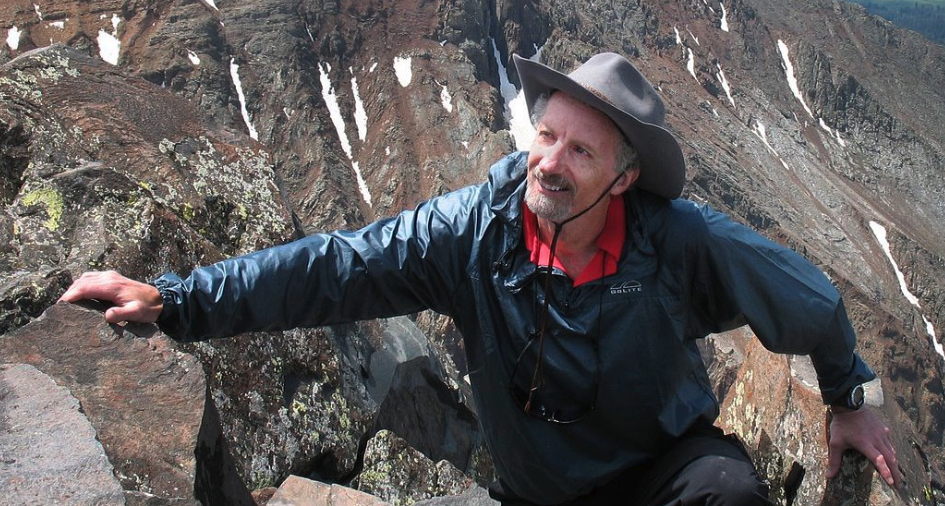“What does our faith offer in moments of crises?”: Philip Yancey reveals where God is when it hurts
Salt&Light // May 10, 2019, 6:14 pm

"I was converted by gratitude, not fear," bestselling author and nature lover Philip Yancey tells Salt&Light. "I wanted to know the Artist who gave us the Great Barrier Reef, the birds you can see in the Bird Park in Singapore, and the magnificent Rocky Mountains where I live." Photo from philipyancey.com.
Where is God when it hurts?
It is a wrenching cry that echoes from all corners of the world, in a multitude of languages.
The universality of the question is borne out in the hunger for bestselling Christian author Philip Yancey’s books – 15 million in print, published in over 50 languages worldwide, garnering 13 Gold Medallion Awards from publishers and booksellers.
A former journalist and editor, Yancey – whose bestsellers include Where is God when it hurts?, Disappointment with God, and What Good is God – has travelled to Mumbai, China, South Africa, Russia, and around his native United States, to address congregations eager for hope, weighed down by doubt, and grieved by loss.
We live on a groaning planet, Paul says, and God’s followers are not exempt from those groans.
Growing up in a strict, fundamentalist church in the American south, a young Philip Yancey had an impression of God as “a scowling Supercop, searching for anyone who might be having a good time – in order to squash them”.
“We heard about love and grace, but I didn’t experience much,” he says. “We were taught that God answers prayers, miraculously, but my father died of polio just after my first birthday, despite many prayers for his healing.”
His search for answers led him to write book after book on faith and doubt which resonated with believers everywhere.
“I’m a pilgrim … searching for a faith that makes its followers larger and not smaller,” he says. “My books are a process of exploration and investigation of things I wonder about and worry about.”
Yancey has since authored more than 20 books that explore the fundamental questions and deepest mysteries of the Christian faith, including Church: Why Bother?, What’s So Amazing About Grace? and Prayer: Does It Make Any Difference?
In an interview with Salt&Light ahead of his upcoming Singapore talks at the 2019 Eagles Leadership Conference on July 25-27, Yancey reveals the backstory behind his books and his own innerworkings of faith:
What made you write Where is God when it Hurts? Did its tremendous reception leave a mark on your own life journey?
As a young journalist, I wrote “drama in real life” articles for Reader’s Digest, and so I interviewed people who had been through tragedy. Again and again they told me: “Christians made it worse!”
They were lying in a hospital bed trying to get well, and a parade of Christians came through with various theories: God is punishing you; no, it’s the Devil; no, it’s God holding you up as an example of great faith; no, your problem is you don’t have enough faith.
We need what I call “grace-healed eyes” to see people as truly thirsty before we introduce them to Living Water.
What a confusion of voices.
I didn’t know the answer, but I did believe that we Christians must somehow find a way to believe in a good and loving God in the midst of a planet that includes much suffering. And I believed that we should be offering comfort, not confusion.
So I dove into that age-old mystery because I needed answers for myself, and writing a book gave me the impetus to go to people who could help. That’s when I met Dr Paul Brand, for example.
I feel so blessed because the reception of the book made everything else easier. Because of that, I was able to quit my job as a magazine editor/publisher and take the leap of becoming a full-time writer. I’ve been able to explore all my questions, one by one, in books.
When I have a question I don’t know the answer to, I write a book about it, for it gives me the opportunity to search and research.
You talk about the “tabletop test” of faith — how does that work?
I refer to the final test to which engineers subject the latest laptop, cell phone, or electronic device. They knock it off a table or drop it on the floor, because that’s what happens in the real world, outside their laboratory.
What does our faith offer in moments of crisis?
In China, never did I hear believers pray for God to relieve them of suffering; rather, they prayed for strength to stay true despite oppression.
In the US, when a mass shooting happens, or an event like 9/11, even the secular New York Times turns to pastors, priests and rabbis; atheists are conspicuously absent from the op-ed pages.
The greatest numerical revival in history occurred in China under communism, and this after the 7,000 missionaries had been kicked out.
I’ve attended prayer meetings in the unregistered churches, and never did I hear believers pray for God to relieve them of suffering; rather, they prayed for the strength to stay true despite the oppression that continues to this day.
Since 1950, the church in China has grown from around three million believers to, perhaps, 100 million. They’ve passed the tabletop test.
What conclusion have you come to regarding the seeming unfairness of pain and suffering, in light of current events like the Easter attacks in Sri Lanka?
It’s not just “seemingly” unfair, life is unfair!
As I was responding to this interview, one of the brightest Christian writers in the US died at the age of 37, leaving a baby behind. A crane fell off a building in Seattle, killing a student at Seattle Pacific University, a Christian school. Several hundred Christians died in terrorist attacks in Sri Lanka.
I often ask myself why the Bible doesn’t treat the problem of suffering in a more systematic way.
I think the biblical writers saw this earth as a broken planet, invaded by the forces of evil. Clearly it doesn’t measure up to God’s original design, or why would Jesus ask us to pray that God’s will be done “on earth as it is in heaven”? (Matthew 6:10)
We have hints of God’s ideal, a model in Jesus of how to respond with comfort and healing, and a hope of final restoration.
In the meantime, we have a world in which great beauty exists alongside viruses, abuse, violence, and gross unfairness.
What helped you accept the notion of a loving God?
Studying the life of Jesus revolutionised my understanding of God.
From the Old Testament I had inherited the idea of God as a distant, fearful being who was easily angered. Jesus showed me a God of mercy and compassion, reminding us that God causes the sun to shine and the rain to fall on the righteous and unrighteous alike.
I shake my head in amazement at the risk God took, turning over the divine reputation to people like us.
Jesus reached out to the least desirable members of society: Moral outcasts, leprosy victims, prostitutes and tax collectors. Later, I went back to the Old Testament and saw many proofs of God’s grace and mercy.
Jesus gave the added depth of a human being embodying the qualities of God on a daily basis.
Yet I would have to say that other people also helped convince me of the reality of a loving God.
Jesus told his disciples that the mark of a Christian is love, and I was blessed in early adulthood, a time when my own faith was still fragile, to encounter loving people.
It only takes one person who lives out the gracious love of God to convince you of its reality.
I shake my head in amazement at the risk God took, turning over the divine reputation to people like us.
Frankly, though, I think it’s very hard to experience God’s love unless you are loved – and that’s our main commission as Jesus’ followers.
How may we as a Church be more Christ-like in our approach towards those who doubt and are suffering?
I’ll give just one key, and it comes from the author Henri Nouwen. He once told me that he used to pray about those “immature people” or even “morally offensive people”.
Then, after spending time among AIDS sufferers, and hearing their stories – “Philip, they were dying, literally dying, in their thirst for love,” he told me – he began praying for “thirsty people”.
It’s easy for the Church to become one more ranking system, a place where we judge doubters or strugglers or societal outcasts.
These are the people Jesus came for: The sick and not the well, the sinners and not the righteous. We need what I call “grace-healed eyes” to see them as truly thirsty before we introduce them to Living Water.
You’ve said that Romans 8 is your favourite Bible chapter. This, in spite of the fact that you are known for your books on doubt, pain and suffering. Would you explain?
Romans 8, like the rest of the Bible, is honest about the human condition. We live on a groaning planet, Paul says, and God’s followers are not exempt from those groans.
It only takes one person who lives out the gracious love of God to convince you of its reality.
Paul adds a word of hope, however: Not that we will avoid bad things, but that even those bad things can be used for our good. (Romans 8:28)
Toward the end of the chapter Paul lists some of the “things” he encountered: Trouble, hardship, famine, persecution, sword. The chapter ends with an amazing proclamation that nothing in all creation – time and space, supernatural powers, death and life – can separate us from the love of God.
I take the pattern of Romans 8 as a template of what God promises for our groaning planet. It will be remade. We will end up as “more than conquerors”.
If God is for us, who can be against us?
Catch Philip Yancey live at the 2019 Eagles Leadership Conference: The Future Leader
Join Philip Yancey and 54 other thought leaders at the 2019 Eagles Leadership Conference: The Future Leader, on July 25-27, Suntec Convention Centre Singapore.
Yancey will be speaking at a plenary dialogue on “The future of leadership”, as well as conducting a masterclass on “Being grace dispensers in a hostile world”.
Special Promo for Salt&Light readers: S$200 off the Early Bird price. Register before May 31 with promo code partnerspecial at www.elc2019.com. Find out more here.
Yancey will also speak on “Finding purpose in God’s design” on Friday, July 26, 2019, 7-9 pm, at Suntec Singapore Hall 405-406.
Free admission to Friday night’s talk is by registration only. Book your seats here.
We are an independent, non-profit organisation that relies on the generosity of our readers, such as yourself, to continue serving the kingdom. Every dollar donated goes directly back into our editorial coverage.
Would you consider partnering with us in our kingdom work by supporting us financially, either as a one-off donation, or a recurring pledge?
Support Salt&Light




